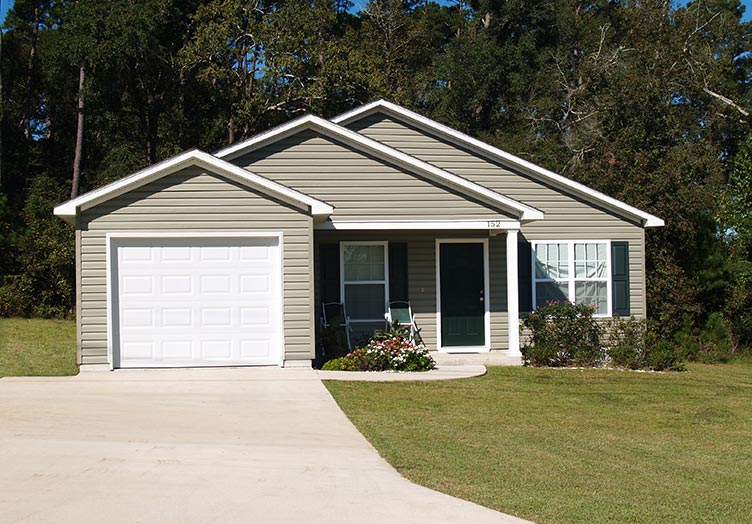
Since the 2017 launch of the Opportunity Zone program, investors have placed their capital gains into any number of available Qualified Opportunity Funds (QOFs). Those funds, in turn, invest in projects ranging from apartment and office renovations, to ground-up retail centers.
One type of investment we don’t hear much about is single-family housing. In fact, a frequent question is, “Can I buy a house in an opportunity zone and call it an investment?”
The answer is, “Yes. . . but.” You can buy anything in a Qualified Opportunity Zone (QOZ) and call it an “investment.” However, to ensure receipt of the QOZ program’s tax-deferral benefits, that house must meet several requirements.
Defining Investment
Part of the confusion about houses and QOZs is that homeownership, by its very nature, can be considered an investment. An individual might buy a house in which to live, and depending on the area, economic activity, and other factors, that house could appreciate in value when it comes time to sell.
However, primary residential homeownership does not lend itself well to the QOZ program. QOZ property (QOZP) investments take three forms: stock, partnership interests, or business property. Furthermore, that QOZP must be held, or used, for an investment, trade, or business. In other words, you can’t buy a house in a QOZ, move in, then call it an investment property. You would need to buy that house, position it as a rental (to obtain income from it), or use it in conjunction with business activities.
The following requirements also need to be met:
QOF set-up. Before acquiring any QOZP, you must self-certify as a Qualified Opportunity Fund (QOF). This is done by 1) filing IRS form 8996 with your federal tax return, and 2) ensuring that at least 90% of the assets you buy are in a designated QOZ.
Substantial improvement. A huge component of the QOZ program involves substantial improvement; this is, after all, an economic improvement initiative. For you, the house investor, this means you have 30 months after closing to double that property’s adjusted basis (excluding land). For example, if you buy a house for $250,000, and the land is valued at $50,000, you have 30 months from closing to invest an additional $200,000 to improve that house.
Long-term property hold. House flipping is not a QOZ “thing.” The idea behind the program is economic improvement, versus immediate profit-taking. This is why the program deadline is Dec. 31, 2026. At that time, the capital gains you invested in the QOF are recognized and taxed. This is also why the longer you hold that QOZ asset, the more likely you can eliminate capital gains taxes on income generated by that asset. Everything in the program is geared toward a long-term hold.
Pros and Cons of QOZ Homes
With all of the above involved in QOZ homeownership, is this type of investment worthwhile? To answer this, it’s a good idea to consider the following advantages and disadvantages of acquiring a QOZ house.
Advantages
- Below-average property prices
- Targeted areas are likely to experience increased economic and commercial growth
- Potential increase in home and rental values
Disadvantages
- Requirement of time and financial resources
- Substantial improvement means doubling the investment amount
- Program success isn’t guaranteed; neighborhoods are at risk from factors including crime, poor economics, and lack of infrastructure
An Opportunity Worth Pursuing?
You could buy a house anywhere and call it an investment; this includes obtaining one in a Qualified Opportunity Zone. But, to ensure receipt of tax-deferral benefits, you must acquire that house for trade or investment, improve it, and hold it long term. Whether this is an ideal investment strategy for you requires due diligence, both of the targeted property, and of your own lifestyle and other goals.
There are material risks associated with investing in QOZ properties and real estate securities including liquidity, tenant vacancies, general market conditions and competition, lack of operating history, interest rate risks, the risk of new supply coming to market and softening rental rates, general risks of owning/operating commercial and multifamily properties, short term leases associated with multi-family properties, financing risks, potential adverse tax consequences, general economic risks, development risks, long hold periods, and potential loss of the entire investment principal.
Past performance is not a guarantee of future results. Potential cash flow, returns and appreciation are not guaranteed. IRC Section 1031 is a complex tax concept; consult your legal or tax professional regarding the specifics of your particular situation.
This is not a solicitation or an offer to sell any securities. There is no guarantee that the investment objectives of any particular program will be achieved.



